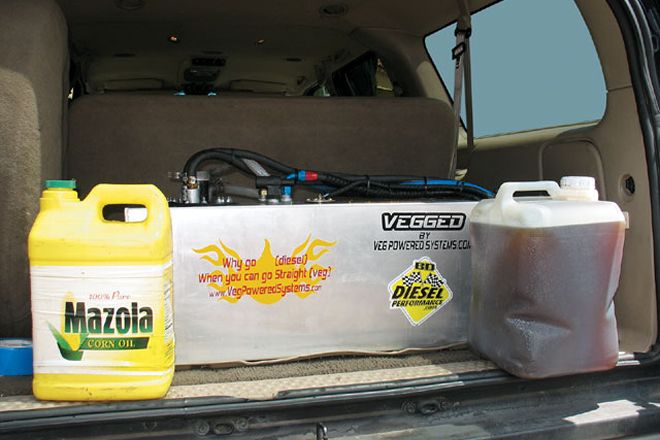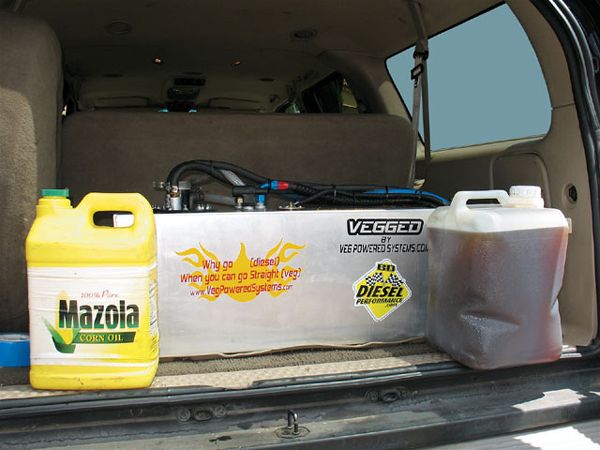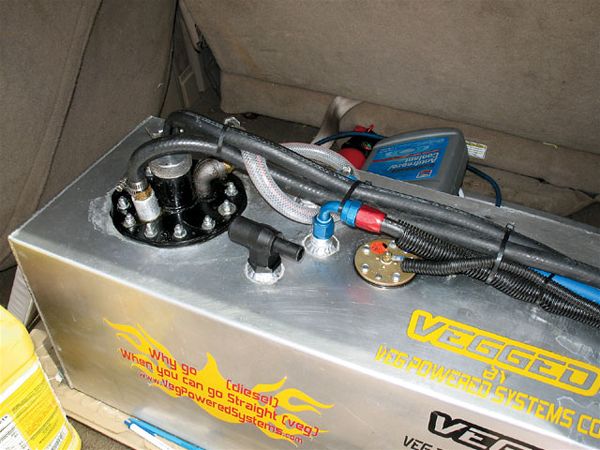
 Jerrod Jones
Former Editor, Off Road
Jerrod Jones
Former Editor, Off Road
By now you've probably heard of running used vegetable or peanut oil in place of diesel fuel. It's quite a proposal, isn't it? Just think: If we could find a way to yield enough crop to take the entire

U.S. population off petroleum-based fuels, we could greatly reduce harmful engine emissions, cut our dependency on foreign oil, and employ thousands if not millions of farmers, plus we'd smell like French fries on the way to work. Sounds like a dream. Well, it's not. It's possible, but a bunch of rich guys stand to lose a whole lot of money if we do it. Did you know the first diesel engine, invented by Rudolph Diesel, ran on peanut oil? It was only after diesel engines went into production that budding oil barons made deals with auto manufacturers and changed our source of fuel to the easily harvestable black crude they had rights to. It's all about money, folks, and that's at the cost of your ancestors, you, and probably your offspring. Kinda makes you want to take a rubber hose and pay a visit to your local oil tycoon, doesn't it?
 We got the chance to spend a few minutes talking with Joel Woolf of Veg Powered Systems in Ojai, California. He let us in on a few points of how his kits work but is pretty secretive about what it takes to make a long-lasting, vegetable-oil-burning diesel. About 30 companies do veggy-oil conversions out there right now, but Veg Powered Systems seems to have taken the lead by offering the premier kit to own. Running vegetable oil in your diesel has to be carefully thought out, and therefore no hack universal kit will cut it for a number of reasons. In this tank is a specially designed heater measured and built for this specific tank's volume. Heat is only one way to get your veggy-burner to run smoothly, though, and not all diesel engines like their fuel at the same temperature. Different diesel engines like different veggy-fuel inlet temperatures (accomplished with line heaters) to run with the best performance and smoothness. Again, it takes a specifically designed kit to accomplish this.
We got the chance to spend a few minutes talking with Joel Woolf of Veg Powered Systems in Ojai, California. He let us in on a few points of how his kits work but is pretty secretive about what it takes to make a long-lasting, vegetable-oil-burning diesel. About 30 companies do veggy-oil conversions out there right now, but Veg Powered Systems seems to have taken the lead by offering the premier kit to own. Running vegetable oil in your diesel has to be carefully thought out, and therefore no hack universal kit will cut it for a number of reasons. In this tank is a specially designed heater measured and built for this specific tank's volume. Heat is only one way to get your veggy-burner to run smoothly, though, and not all diesel engines like their fuel at the same temperature. Different diesel engines like different veggy-fuel inlet temperatures (accomplished with line heaters) to run with the best performance and smoothness. Again, it takes a specifically designed kit to accomplish this.
Want to know a better way to get back at them? Take their money away. Push for fuels that can be grown, ask questions, and maybe even take yourself off of petroleum. We know it's hard to grasp. Heck, we're gearheads and should be the most die-hard fuel fans out there! We still are. We love fuel, but we don't love where it comes from. If there's another viable source of fuel out there, then we're all ears-of corn! (Jeez, sorry, bad pun.) But we're also skeptical. There are potential problems with most alternative fuels: less energy even with higher octane ratings, how fast they can be renewed, cost to produce, and what longterm effects they'll have on your engine.
Corn is big in the news right now as a good source of ethanol for E85. Do you now what E85 is? It's 85% gasoline and 15% ethanol. Nice gesture, but hardly a cure for our fuel thirst. There is not enough arable land in the entire United States to grow the corn we would need to run our gas engines on pure ethanol. So we often sit back and wait to see what others figure out with fields like this. We don't have time to run tests in Petersen's top-secret labs, as we're too busy trying to bury our trucks (and heads) in the dirt.
However, fueling diesels with used vegetable (or peanut) oil is one alternative that has already been proven. In fact, petroleum diesel was originally a substitute for peanut-oil. We ran across a company that seems to have the right plan for getting your diesel back to its roots. The folks at Veg Powered Systems have taken measures to ensure that your diesel vehicle will run smoothly on vegetable oils without decreasing the life of the engine. Their dual-fuel diesel add-on system allows you to switch your oil-burner back and forth from organic to inorganic. Running a veggy-oil-only system is not viable right now because of a lack of filling stations. If the movement caught on and filling stations were willing to try it, we're sure vegetable oil could be refined and made uniform enough to run standard in every diesel vehicle around. The biggest problem with it right now? The fuel source has leftover French fries still in it.


